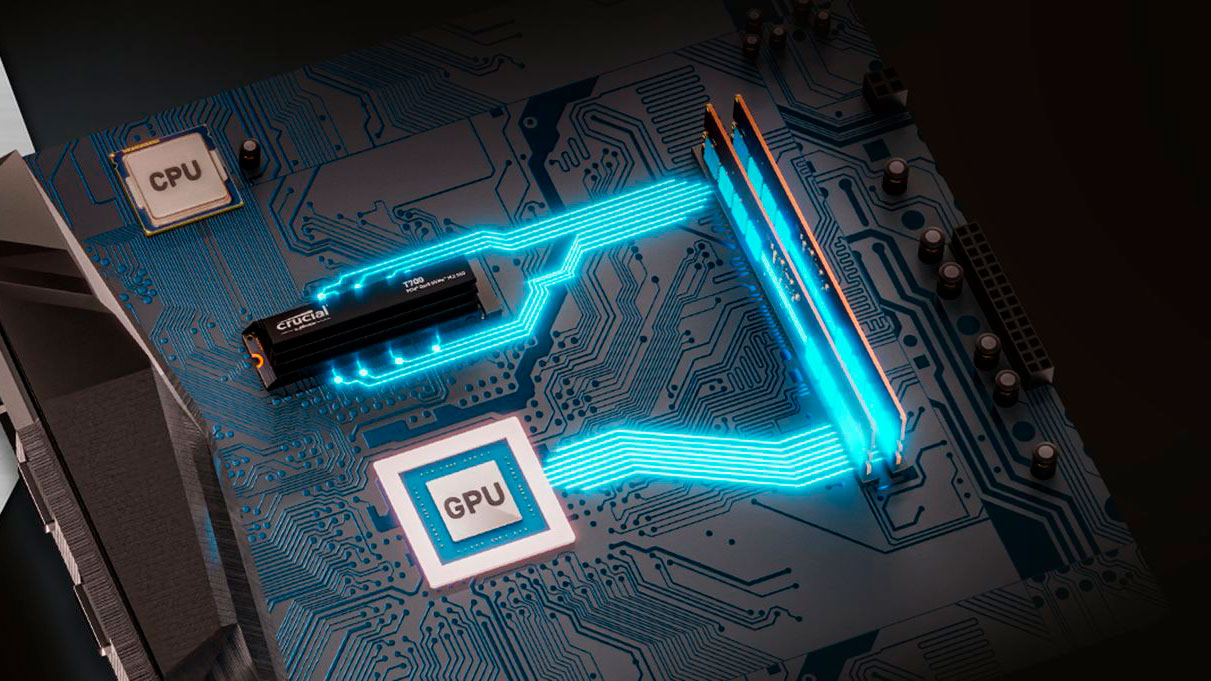Nvidia Driver Boosts GPU Decompression By 17 Percent On PCIe 5.0 SSDs

Get Tom's Hardware's best news and in-depth reviews, straight to your inbox.
You are now subscribed
Your newsletter sign-up was successful
Nvidia's latest GeForce 535.98 Game Ready driver ushered in support for Diablo IV and fixes for some general bugs. Among the improvements, the driver also brought a significant uplift in GPU compression, boosting performance on PCIe 5.0 SSDs, such as the Crucial T700, one of the best SSDs.
DirectStorage, which substantially decreases loading times in games, leverages GPU compression. Game assets come in a packaged format that requires decompression during playtime. Typically, the processor is in charge of decompressing the game assets. GPU compression takes the load off the processor by having the graphics card process the decompression, so driver-based optimization can significantly improve GPU compression.
Gamers don't necessarily need an SSD to take advantage of DirectStorage. The technology works fine even on old platter drives. However, SSDs get the most performance benefits from DirectStorage.
Compusemble discovered a GPU compression performance uplift when comparing the previous GeForce 535.03 driver with the 535.50 beta driver. The latest GeForce 535.98 driver already includes the optimizations. Compusembler employed the T700 and an undisclosed PCIe 4.0 SSD for its comparison. It uses the typical avocado benchmark to evaluate the performance between the two SSDs and Nvidia GeForce drivers. Admittedly, the list of PC games with DirectStorage support is extremely short, but it would have been nice to corroborate the avocado benchmark results with real-world results from Forspoken.
| SSD | GeForce 532.03 Driver (Seconds) | GeForce 535.05 Beta Driver (Seconds) | GeForce 532.03 Driver (GB/s) | GeForce 535.05 Beta Driver (GB/s) |
|---|---|---|---|---|
| Crucial T700 | 0.24 | 0.20 | 28.09 | 33.12 |
| PCIe 4.0 SSD | 0.30 | 0.29 | 22.26 | 22.80 |
The GeForce 535.05 beta driver boosted the bandwidth on the T700 from 28.09 GB/s to 33.12 GB/s, amounting to an 18% improvement. Meanwhile, the same driver did little for the PCIe 4.0 SSD, only increasing the bandwidth by 2%. So, how much impact does more bandwidth have on loading times?
According to Compusemble's results, the T700's loading dropped to 0.20 seconds from 0.24 seconds. The first impression may not be exciting since PCIe 5.0 SSDs are already very fast. However, the math shows that the newer driver decreased the T700's loading time by 17%, aligning with the increase in bandwidth. On the contrary, the PCIe 4.0 SSD only enjoyed 3% lower loading times.
The evidence reveals that the PCIe 4.0 SSD has seemingly reached its maximum potential. Unfortunately, the drive is at a dead-end, receiving minimal enhancements from the later GeForce driver. On the other hand, there still seems to be untapped performance for PCIe 5.0 SSDs. The T700's performance is testimony to this. DirectStorage has a bright future for PC gaming. Microsoft has been hyping up the technology for threes year now. We just need more games to support it.
Get Tom's Hardware's best news and in-depth reviews, straight to your inbox.

Zhiye Liu is a news editor, memory reviewer, and SSD tester at Tom’s Hardware. Although he loves everything that’s hardware, he has a soft spot for CPUs, GPUs, and RAM.
-
Since they are using the compression format "GDeflate", means that games won't see any of these DirectStorage benefits for "free", since the game developers will need to first work to implement them.Reply
I don't see this feature getting very popular in gaming though.
I mean, it will be up to individual games to implement DirectStorage to see the benefits of the API. That means not only using the necessary API hooks, but also shipping games with assets packed using the new GDeflate algorithm.
Even though the vast backwards compatibility of GDeflate means that game devs can essentially hit the ground running here on DX12 games , but the fact that it involves game assets means that full DirectStorage 1.1 support cannot be trivially added to existing games (backported into existing games).
Developers would need to redistribute (or otherwise recompress) game assets for GDeflate, which is certainly do-able, but future games are a totally different story.